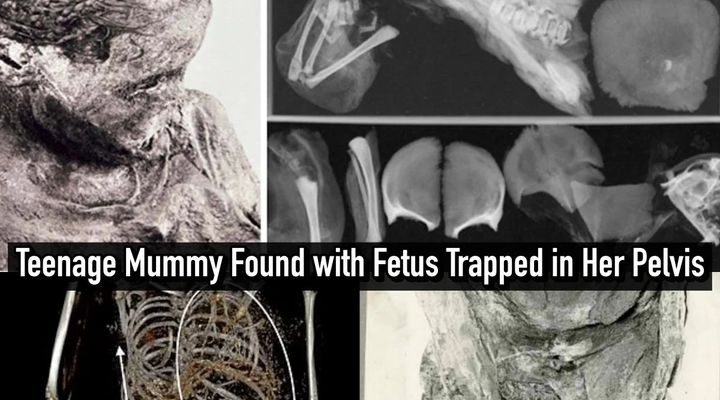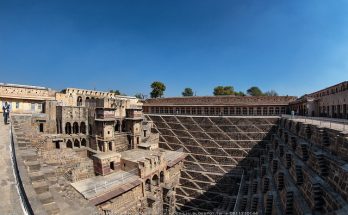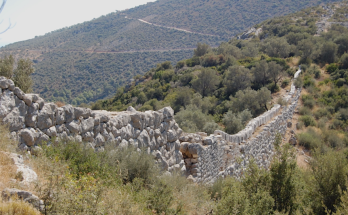The full tragic story revealed by mummified remains of a female teenage mummy of just 14-17 years old, who died during childbirth, has been discovered by archaeologists in Egypt. What makes the find both horrifying and extraordinary at the same time, is one fetus and placenta found in the pelvic area, and another in the chest pointing to unresolved complications during childbirth nearly 1,500 years ago.
The teenage mother was unearthed in 1908 at the El Bagawat cemetery in Egypt’s Kharga Oasis, with the head of the first baby stuck in the birth canal, causing the death of both children and the mother. The researchers noted that she had been extensively layered with “a great quantity of salt,” an ancient Egyptian practice known for its desiccating properties that effectively dried out the entire body. The body was dated to the Late Dynasty in ancient Egyptian history, spanning from 404 to 343 BC.
A Decapitation of Gruesome Measure
The study authors describe this outcome as a case of “traumatic fetal decapitation,” a rare consequence of breech presentations, i.e., feet first during childbirth. The entrapment of the baby’s head in the birth canal proved fatal for both the infants and the young mother. The researchers relied on field notes dating back to 1908, which documented the earlier work of archaeologists. These notes revealed that the process involved unwrapping the body, removing her arms, macerating the femora, and making an incision on the abdomen.
In a recent study published in the International Journal of Ostearchaeology, scientists revisited the mummy and employed computed tomography (CT) scans to unravel the details of this gory incident. Contrary to what was initially presumed, the scans disclosed the presence of a second fetus within the woman’s chest cavity.
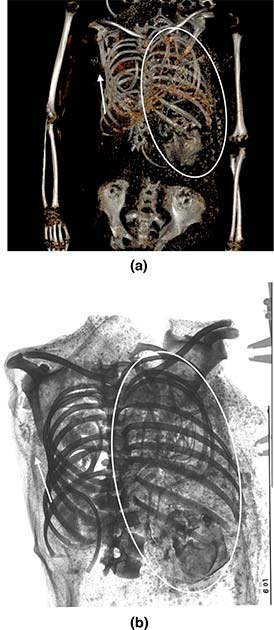
(a) CT scan of mummy. Circle indicates fetal skull, ribs and long bones lodged in chest cavity.
(b) The CT scans detected another fetus lodged in the mummy’s chest cavity, displaying long bones, ribs, neural arches, crania, and five hand bones. (Francine Margolis, David R. Hunt/onlinelibrary.wiley.com)
“This is a rare find,” Francine Margolis, one of the study authors, told McClatchy News. “There are several examples of women dying during childbirth in the archaeological record (one was a twin pregnancy). However, there has never been one found in Egypt.”
The investigation took a grim turn as researchers observed that the baby placed between the woman’s legs was missing its head. A closer examination revealed that the infant’s head was still lodged in the mother’s pelvis, leading to the chilling realization that the fetus had been decapitated during delivery. The breech position complicated the passage through the birth canal further.
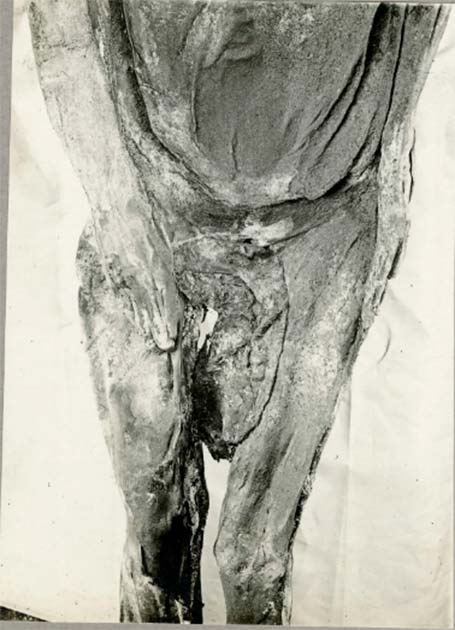
Intrigue surrounded the second fetus found in the woman’s chest cavity: the researchers speculate that embalmers might have been unaware of the twin pregnancy, neglecting to remove the second fetus before mummification. As the mummy’s diaphragm dissolved, the unborn twin could have migrated from the womb to the chest cavity, reports IFL Science.
“One possibility is that the second fetus was not known to exist to anyone at the time, including the embalmers,” researchers said. “It was uncommon in this later Dynastic period to remove organs during the mummification process.”
The Unholy Twins: Egyptian Attitudes Towards Twin-Birth
“We hypothesized that the Egyptians knew twin births carried more risk and complications and therefore tried to protect against it,” Margolis said.
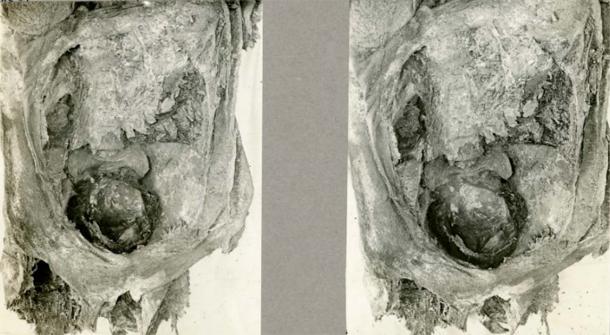
The ancient Egyptians held a deep reverence for symbolism, balance, and order, and these beliefs extended to their views on procreation and childbirth. The findings underscore the perilous nature of pregnancy, labor, and delivery during ancient times, particularly for twin births, which were viewed unfavorably in ancient Egypt.
In fact, a spell found on an ancient papyrus, the Oracular Amuletic Decree, said, “We shall (cause her) to conceive male children and female children. We shall keep her safe from a Horus-birth, from an irregular birth and from giving birth to twins.”
Weirdest Ancient Chinese Pregnancy and Birth Traditions (Video)
Birthing Trauma Comes from Two Million Years of Walking Upright
Spells and incantations, such as this one reveal the cultural aversion to twin births, seeking protection against “irregular birth” and delivering twins. The tragic tale of this young mother and her unborn twins is a tragic reminder of the challenges faced during childbirth in antiquity.
“Reasons included the infants’ morbidity and prematurity, the difficulty of breastfeeding two infants for longer, and the belief in superfecundation: more than one father was held responsible for procreating twins,” the authors concluded.
Top image: The teenage girl, who was not more than 17 years old, was buried alongside the decapitated baby in a tomb. This led experts to speculate that she might have been unaware of her pregnancy with twins. Right; Rradiograph of mummified fetus found lodged within the teenage girl’s pelvis. Source: Francine Margolis, David R. Hunt/onlinelibrary.wiley.com
By Sahir Pandey
